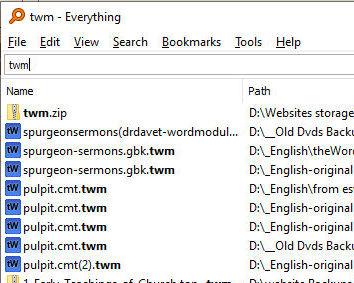Biblical and Theological Dictionary (5 vols)
Biblical and Theological Dictionary (5 vols)
By Richard Watson
This module was taken from Wordmodules.com .
Richard Watson published Biblical and Theological Dictionary in 1831-32, following his Theological Institutes, the first Methodist theology.
This 5 volume dictionary contains 1,600+ entries ranging from a paragraph to several pages. Watson addresses philosophical issues, comparative religions, apologetics, matters of hermeneutics, and basic Christian beliefs.

Bounds - Praying Pulpit begets a Praying Pew is a single chapter work on prayer in the pulpit causing prayer in the pew.
Read: Bounds - Praying Pulpit begets a Praying Pew.
The complete dictionary title is:
A Biblical And Theological Dictionary: Explanatory Of The History, Manners, And Customs Of The Jews And Neighbouring Nations; With An Account Of The Most Remarkable Places And Persons Mentioned In Sacred Scripture; An Exposition Of The Principal Doctrines Of Christianity; And Notices Of Jewish And Christian Sects And Heresies.
About Richard Watson
After the death of John Wesley, Richard Watson became the theological leader of Methodism. Robert Chiles wrote, “Both in Britain and in America Richard Watson was easily the single most determinative of the early Methodist theologians.”
In a day when United Methodism is looking for answers and the holiness movement claims to be something it is not, this book defines the beliefs of early Methodism.
Watson rejected the rationalism formulated in German schools. He affirmed the full authority and inerrancy of Scripture. He held that it was legitimate to use reason in sorting out textual variants and in interpreting the meaning of the text, but once the text was established and understood – revelation takes priority over reason. Regarding the assurance of personal salvation, Watson embraces the doctrine of the direct witness of the Spirit.
Watson held that Genesis 1-3 were to be accepted as a literal account and that the flood was universal. While his article on Arianism might be thought obsolete, actually his refutation of Arianism will also work against Jehovah’s Witnesses. Watson had an adequate grasp of the Trinity and dealt with early Church heresies concerning the nature of Christ. At one point in his ministry, Watson even had to correct Adam Clarke on the eternal sonship of Christ.
Watson contended for the virgin birth of Christ and dealt extensively with the atonement. Included are articles on atonement, expiation, propitiation, and sacrifice. Watson is most helpful in his analysis of Calvinism. Included is a 15-page account of the Synod of Dort which shows the intolerance and injustice with which Arminians were treated. Watson’s definition of such terms as: calling, election, foreknowledge, necessity, predestination, reprobation, will, and vocation are Arminian.
Watson rejected such doctrines as universalism and annihilationism, which have been embraced by some liberal Arminians of our day. Watson’s vigorous denunciation of Roman Catholicism reflects the view of the Reformers. In a day when the only sin is intolerance and evangelicals are compromising with Rome, Watson’s emphasis will come as a surprise to some who do not have the true facts.
While holding to a historical approach to the interpretation of prophetic passages, Watson’s greatest strength regarding eschatology is his optimism that the kingdom of Christ will prevail.
Richard Watson was one of the greatest theologians the Church has ever known. Although he is fallible, the chief value of this dictionary is its refutation of Calvinism. Whoever defines the terms, controls the debate. Watson’s definitions and historical accounts, his exegesis and citation of primary sources will strengthen this generation of ill-equipped Arminians to defend their faith. watson-richard-biblical-and-theological-dictionary.dct_.gbk_.twm (0 downloads )
Watson Biblical and Theological Dictionary (5 vols)
Watson-Richard-Biblical-and-Theological-Dictionary.dct_.twm
Version: 1.0
Advertisement
 Helpful Windows User Tip for "Searching Everything" on your PC. The Everything Search utility program is a freeware file search utility that is superfast and very useful for finding all occurrences of a file. It takes about 3-6 seconds to start, but after that, every search is just about instantaneous. Very fast, very useful. I highly recommend you download this free PC utility program if you ever have problems finding a file on your PC Computer.
Helpful Windows User Tip for "Searching Everything" on your PC. The Everything Search utility program is a freeware file search utility that is superfast and very useful for finding all occurrences of a file. It takes about 3-6 seconds to start, but after that, every search is just about instantaneous. Very fast, very useful. I highly recommend you download this free PC utility program if you ever have problems finding a file on your PC Computer.
twtutorial.com Helpful Tip "Everything Search".
Note: You can grab and drop files from this tool to other windows.

No Comments
Comments are closed.